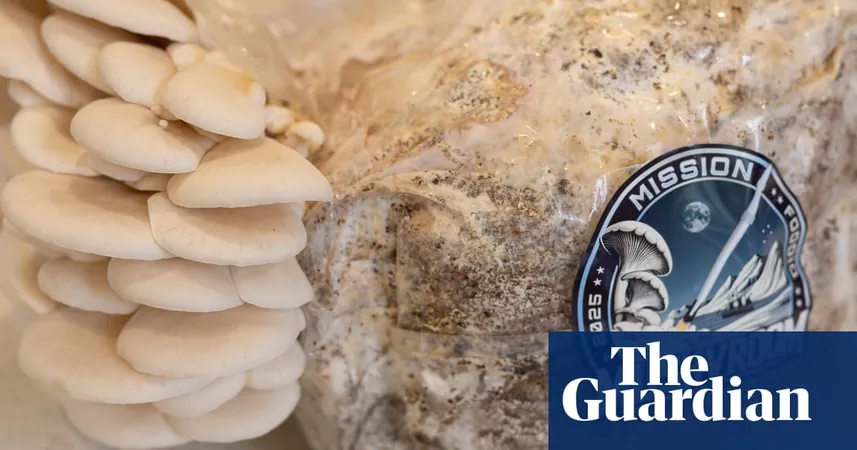
A Groundbreaking Adventure: Australian Company to Cultivate the First Mushrooms in Space!
2025-03-25
Author: Wei
Introduction
In an exciting development in the realm of space exploration and agriculture, an Australian company, FOODiQ Global, is set to make history by attempting to grow oyster mushrooms in orbit during SpaceX's Fram2 mission, scheduled to launch in early April from the Kennedy Space Center in Florida. This mission represents a remarkable step towards sustainable food production in space.
The Fram2 Mission and Key Participants
The Fram2 mission, which will mark the first human spaceflight aimed at orbiting Earth's polar regions, is planned to last for three to five days. The mushroom experiment will take place on the final day of the mission, with Australian adventurer Eric Philips as the experiment's conductor. Philips will become only the fourth Australian to travel to space, following in the footsteps of renowned astronauts Dr. Paul Scully-Power, Dr. Andy Thomas, and Dr. Chris Boshuizen.
Mushrooms as the Perfect Space Crop
FOODiQ Global's CEO, Dr. Flávia Fayet-Moore, has dubbed mushrooms the "perfect space crop." This is due to their rapid growth rate, nutritional benefits, and the fact that they can be consumed raw, eliminating the need for complex food processing technologies currently absent in space. "Because we don't have technology to process food in space yet, NASA is focusing on research into 'grow, pick and eat' crops like lettuce, tomatoes, and mushrooms," she explained.
Nutritional Advantages of Mushrooms
Mushrooms hold unique advantages as a food source. Notably, they are one of the few natural sources of vitamin D, particularly when subjected to ultraviolet light—an essential nutrient for space travelers. According to Dr. Fayet-Moore, "They double in size every day and require minimal inputs—they don't need special fertilizers nor excessive water." Beyond their fast growth, mushrooms are also rich in potassium, selenium, and copper, making them a highly versatile and nutrient-dense food choice.
The Importance of Cultivating Food in Space
The cultivation of food in space is gaining recognition as a vital aspect of future lunar and Mars missions, which ranks among NASA's top priorities. As space agencies prepare for long-duration missions, sustainable food sources like mushrooms could become essential for astronaut health.
Previous Fungi Experiments in Space
This isn't the first venture into space for fungi. In a previous experiment last August, researchers from Swinburne University sent vials containing various types of fungi, including lion's mane and turkey tail, to the International Space Station. However, those experiments were limited to mycelia, the root-like networks of fungi, rather than the fruiting bodies that we typically consume.
Growth Documentation and Future Analysis
As the mission unfolds, if the mycelia develop into oyster mushrooms, Philips will meticulously document their growth, crop yield, and any signs of contamination. Once he returns to Earth, FOODiQ Global plans to analyze the nutritional content of the mushrooms to understand how microgravity influences their development, comparing these results with control samples stored back in Florida.
Conclusion
As we stand on the brink of a new frontier, this audacious experiment could revolutionize food cultivation in outer space. Will mushrooms thrive in the cosmic void? Stay tuned for updates as this groundbreaking mission unfolds!


 Brasil (PT)
Brasil (PT)
 Canada (EN)
Canada (EN)
 Chile (ES)
Chile (ES)
 Česko (CS)
Česko (CS)
 대한민국 (KO)
대한민국 (KO)
 España (ES)
España (ES)
 France (FR)
France (FR)
 Hong Kong (EN)
Hong Kong (EN)
 Italia (IT)
Italia (IT)
 日本 (JA)
日本 (JA)
 Magyarország (HU)
Magyarország (HU)
 Norge (NO)
Norge (NO)
 Polska (PL)
Polska (PL)
 Schweiz (DE)
Schweiz (DE)
 Singapore (EN)
Singapore (EN)
 Sverige (SV)
Sverige (SV)
 Suomi (FI)
Suomi (FI)
 Türkiye (TR)
Türkiye (TR)
 الإمارات العربية المتحدة (AR)
الإمارات العربية المتحدة (AR)